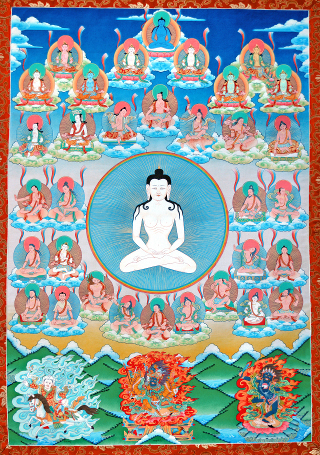
Lama Sangye and Geshe Samten will explain the nine Ngöndro practices that are the traditional foundation of Bön. These practices are indispensible for beginners, but also very advanced practitioners do well to continue to practice Ngöndro. Indeed, Shardza Rinpoche is said to have practiced Ngöndro throughout his life, always starting a new set of 9 times 100000 when he had completed a set.
There is a slight change of schedule: the ngondro teachings will be spread out over several years and will begin Nov 21-22, 2015.
On the weekend of Nov 14-15 Lama Sangye will give teachings on the Monlam Thaye. This teaching is not part of Ngondro, but it is suitable for beginners, too.
(1) November 21-22, 2015: Teaching by Lama Sangye Mönlam - Guru Yoga, Refuge, Prostrations, Bodhicitta - all the details and visualizations of these essential practices, and also the practice of the nine purification breaths.
(2) May 14-15, 2016: Teaching by Geshe Samten Tsukphu on the MA-TRI mantra
The dates of the remaining ngöndro weekends are yet to be determined. The following topics are planned:(3) the SA-LE-Ö Mantra - the interpretation of the individual syllables, the visualization and the melody. Also, some context on Shenlha Ödkar's cycle "zhiwa A-sal" from which this mantra is taken.
(4) The DU-TRI-SU Mantra - the interpretation of the individual syllables, the accompanying visualization and some background information on the text "clearing obscurations and eliminating the realms of bad rebirths" from which this mantra stems.
(5) the Hundred Syllable Mantra - the interpretation of the individual syllables, the story of the black and white temple, Nampar Gyalwa and his retinue, connections to confession and purification practice.
(6) Mandala practice - the mandala offering in its various forms, the mantras, verses, and mudras of the mandala offering, the melody of the short mandala offering, all the practical details of the offering of the physical mandala, including the mythological geography underlying the arrangement of the physical mandala.
The weekends form a complete series of ngondro teachings, but individual teachings can be attended independently. That is, the earlier weekends of the series are not prerequisites for the later ones. Each of the weekend teachings is suitable for beginners as well as for advanced practitioners.
